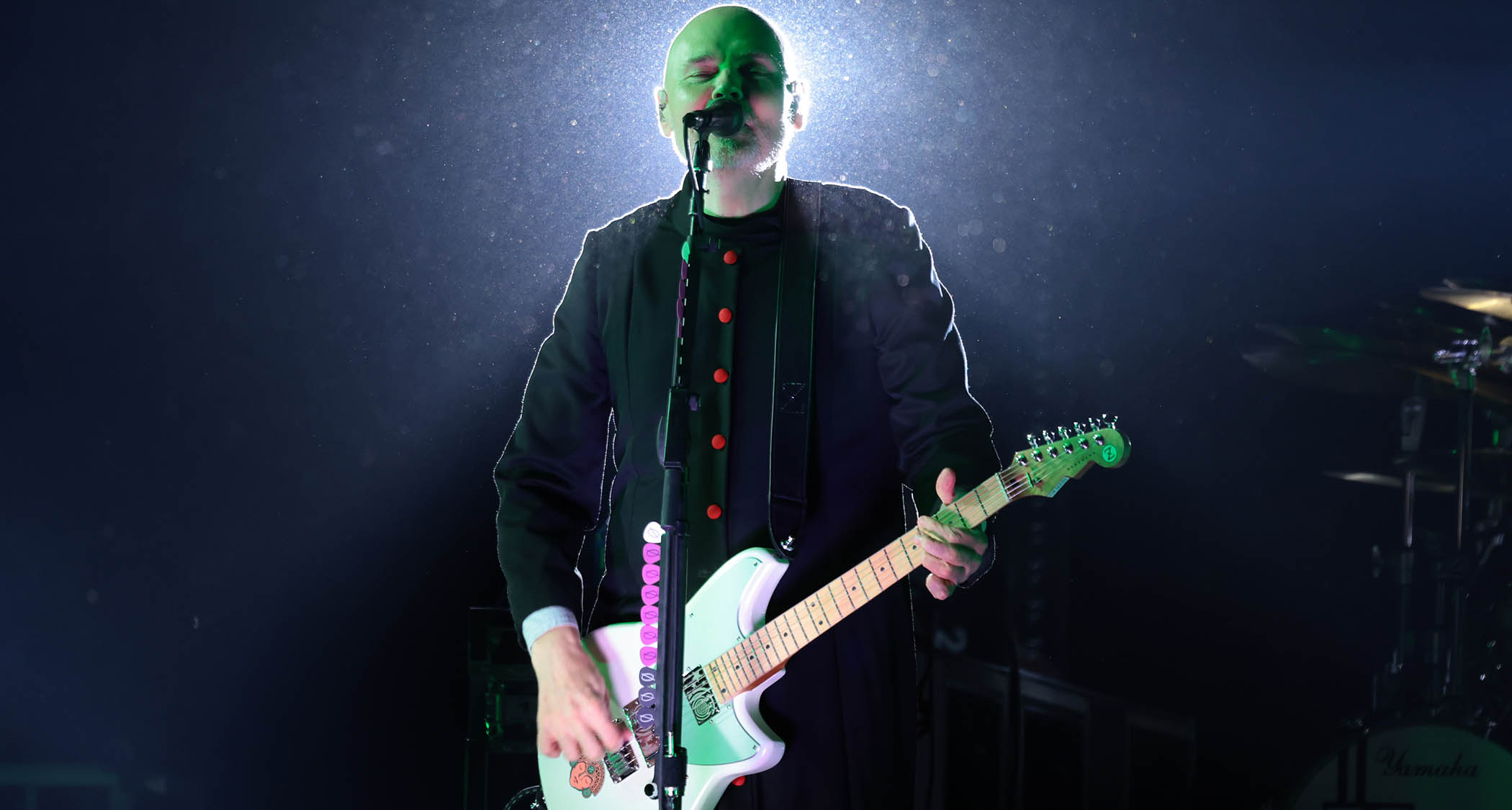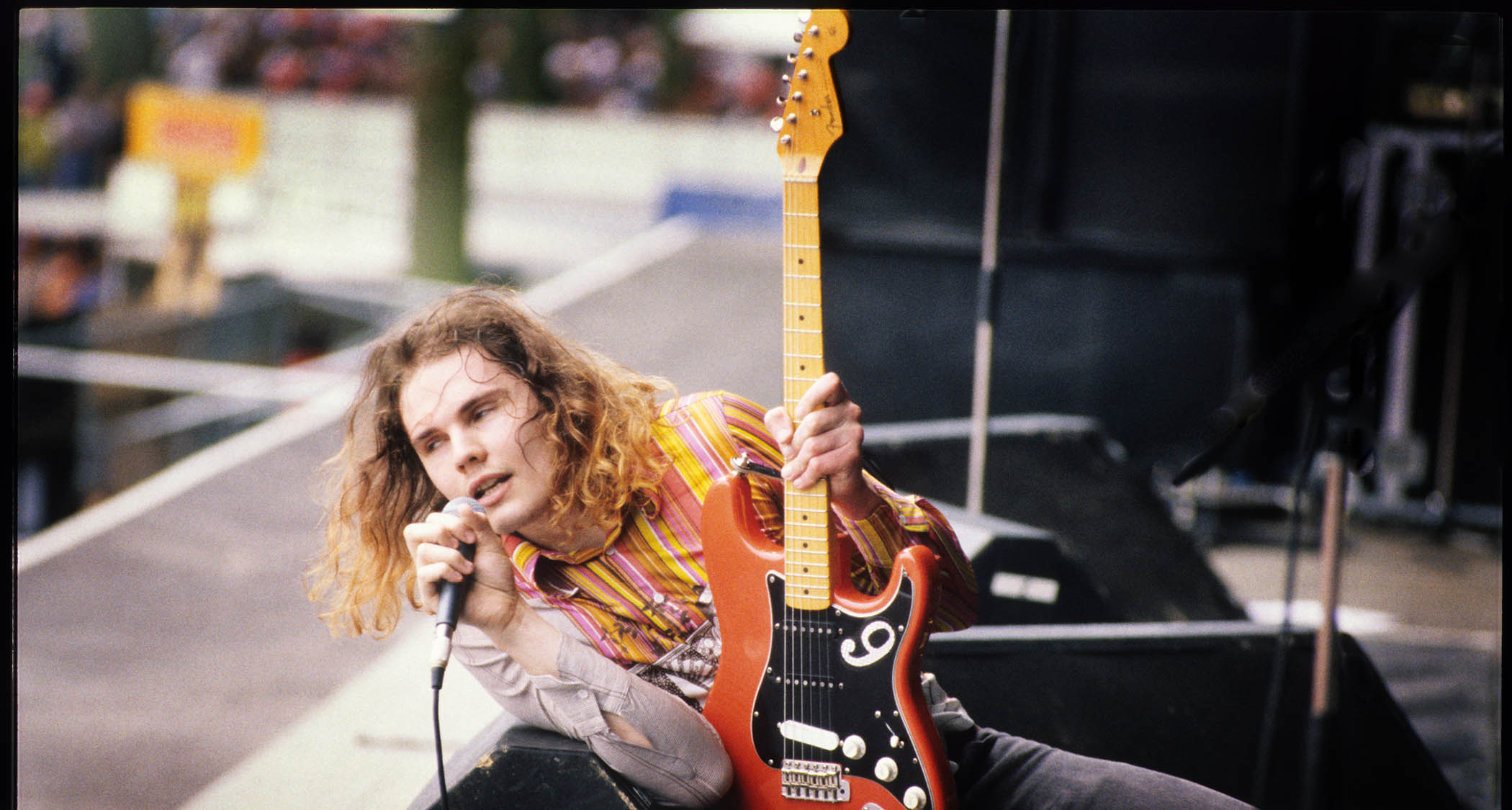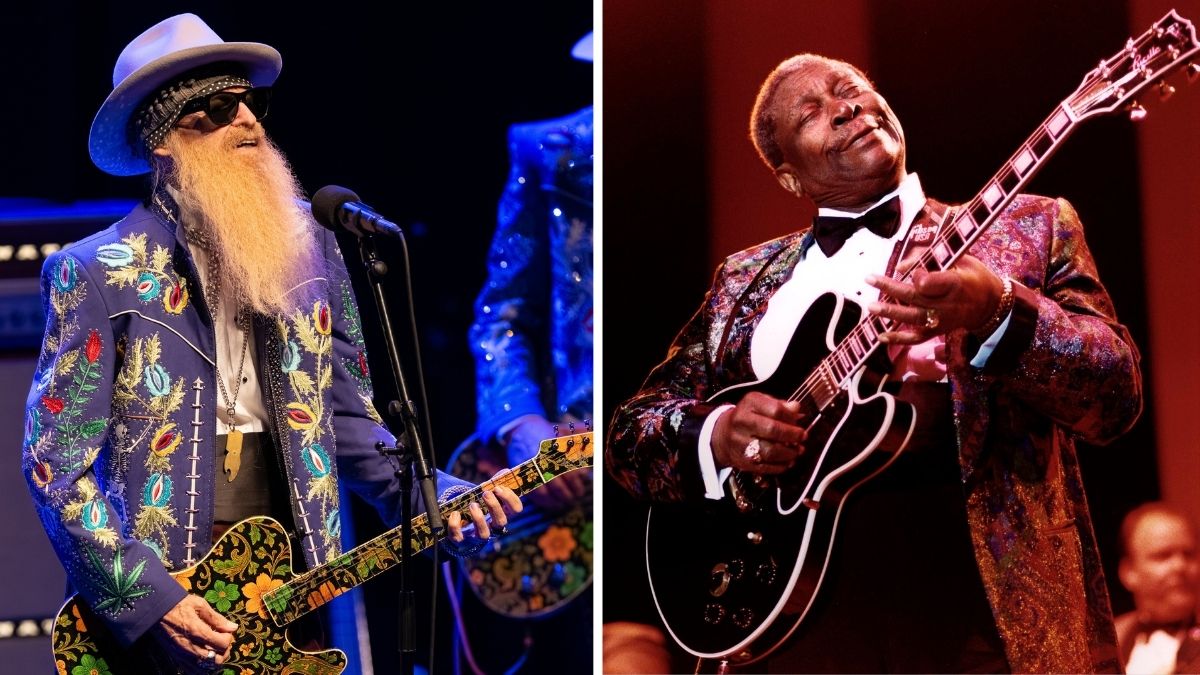“I still use the Strat and Big Muff sound here and there for overdubs, but when I watched Eddie Van Halen play 3 feet in front of me, I learned that it’s about the hands”: Billy Corgan on critics, tone secrets, and how he keeps Smashing Pumpkins fresh
Aghori Mhori Mei sees Corgan and co. finding a fresh perspective in revisiting gear and writing approaches from the past, and – “for a change!” says Corgan – fans and media alike are loving it

All the latest guitar news, interviews, lessons, reviews, deals and more, direct to your inbox!
You are now subscribed
Your newsletter sign-up was successful
Dating back to the late 80s and led by Billy Corgan, Smashing Pumpkins have polarised and galvanized with records such as Gish (1991), Siamese Dream (1993), Mellon Collie And The Infinite Sadness (1995), and Adore (1998) through an outright refusal to adhere to genre confines, regardless of the success those confines afforded them.
Because of this, and Corgan’s tendency to speak his mind, critics and fans alike have had a field day. But that hasn’t stopped those same pundits from filling seats in arenas, such is life for the Pumpkins – light and shade, as it were.
But things change, as do attitudes, especially when it comes to rock music – and even more so when you’re a Pumpkin. This is never truer than in the case of Aghori Mhori Mei, the Pumpkin’s 13th studio record, which, upon its sudden dropping in August of 2024, has been universally praised by critics and fans alike.
Corgan admits that the process and sound of this new record harkens back to the band’s early days. But don’t mistake this for a nostalgia trip.
“It’s something we argue about behind the scenes,” says Corgan of the band’s approach. “I think if I was being overly simple, or if something feels like, ‘I’ve been there, done that,’ I’d be less interested, even if I like the riff.”

From a guitar perspective, Corgan doesn’t feel he’s returning to the well as much as he’s left his old approach behind long enough that it feels fresh again.
“Our way of making music seems to be very different from other groups,” he says. “There’s a long map there. If you want to bother charting the wins and losses, overall it’s been a singular path, which is something I’m really proud of.”
All the latest guitar news, interviews, lessons, reviews, deals and more, direct to your inbox!
Monstrous new tracks like Edin, Pentagrams, and Sighommi feature mega riffs, distorted sounds, and some typically searing Corgan solos. Fans should be – and are – happy, yet Corgan sees a trend.
“People get weirdly bent out of shape when I talk about my guitar playing,” he says. “It’s a strange thing that I find really curious. I don’t know what to think about it. The guitar in the last 20 years, in many ways, was highly marginalized in independent music as people went toward electronics and beats and production values. When you get to the issue of me as a player, I’m happy to point out that I’m not a particularly skilled player because I never took lessons.
“It’s interesting to note the number of people who were influenced by how I played and went on to do amazing things,” he adds. “It gets into this weird conversation, where the public has one perception, but that doesn’t always translate in alternative music – especially in a guitar magazine – like metal or even country. I think it’s really more a contrivance of the genre.”
Come what may, Corgan isn’t bothered by any of it.
“You kind of stand up for yourself and say, ‘Hey, how is it that this band is still here, kicking ass so many years later?’ If the way the intelligentsia rates us… does it really sort of hold up against, let’s call it, empirical data? So, by and large, I’m totally fine with whatever people perceive. The fact that young people seem very interested in what we’re doing currently, not just in the past, is really important to us.”
What was your intent as far as guitar sounds going into Aghori Mhori Mei?
“I’ve always tried to find something new every album. I think I wanted something that was a bit clearer and more old-school. That’s somewhat contradictory because our old-school sound wasn’t necessarily clear… but I think I kind of found it in what we did do.”
You’ve never been one to cater to fans in terms of harkening back to old sounds, so why do it now?
“It just seemed to go with the songwriting. It was exciting to play with. I guess in the late 80s and early 90s, we played with Marshall JCM800s, and there was a certain midrange clarity there that I liked. But at some point I went off of it, so it was cool to go back there. To hear the way we used to voice guitars – it wasn’t sentimental as much as it was just trying to find something that felt fresh.”
From a gear perspective, what was the key to finding that voicing?
“I always start by trying to use new equipment in a novel way so that what I’m hearing myself play seems unfamiliar to me. I sort of have to adjust my playing, and then there becomes this relationship between the sound and the way I play.”
What song kicked that process off for you?
“I don’t remember… We went to Nashville somewhere along the way and did about 60 instrumental demos. So it was just a lot of riffs; it was what people would call a ‘riff tape’, I guess. That would have been the start of it, but it also evolved out of the types of riffs that I was writing. Sorry, I’m trying not to be too nerdy because once I go in there, it just goes on forever!”
Be as nerdy as you like! How do you decide what riffs are not only worth pulling out but Smashing Pumpkins-appropriate?
“Well, there really isn’t any ‘Smashing Pumpkins appropriate’. That’s always been part of the public part of the argument because we were able to establish such an identifiable approach.
“It became this hat that we were always supposed to wear. I do feel good now that, over time, people have recognized that there are other kinds of languages that we’ve developed under the umbrella of the Smashing Pumpkins, you know?”
On a deeper level, it seems that no matter what you do, the expectations placed on you and your band are sort of unfair. It’s damned if you do, damned if you don’t.
“First of all, I don’t mind being held to a high standard, you know? If that standard is somebody’s perception of a standard that we created, that’s even better.
“Certainly, we notice at times where it doesn’t seem that people are held to the same aesthetic and musical standards that we are, but that’s okay. I was – and am – a Rush fan. I held them to a very high standard, so maybe there’s a sort of backward compliment in it. But as far as the rest of it goes, I don’t have a really clear answer.”
It doesn’t hold you back or cloud your vision as a guitarist, then.
“It gets into… this is more of a science dissertation… but I really think it gets a lot into the transition era between pre-social media and post-social media branding of artists.
Try to arrange the guitar parts into a musical composition before the vocals are even involved. So if you just listen to the track, the track itself is very exciting from a guitar, rhythm, and riff perspective
“There have been artists that have been very successful coming out of the 90s – and I don’t need to say who they are – and they’re more successful than we are by and large, almost without exception, but they’re known for doing one or two things really well. We, of course, moulded ourselves more like Zeppelin or The Beatles, where we wanted to be a band that could play any style we chose. But in the post-social media age, that works against you.”
How so?
“Because, on some level, you’re always pitting people against each other. It was sort of novel in the 90s because, again, very few people were doing it. But now there are more independent artists who do that, and they’re more celebrated as auteurs in a non-commercial sense. It’s the schism between a band that refuses to have one personality and a commercial band that sells a lot of tickets. It creates constant tension.”

Having said that, Aghori Mhori Mei seems to have satisfied a lot of fans.
“For a change! [laughs]”
The opening three tracks, Edin, Pentagrams, and Sighommi, feature killer riffs and great songwriting. Can you give insight into how you put that trio together?
“Thank you for saying that, really. My approach was to do it the way we used to do it. It’s a very effective way of arranging the guitars. Simply put, you try to arrange the guitar parts into a musical composition before the vocals are even involved. So if you just listen to the track, the track itself is very exciting from a guitar, rhythm, and riff perspective. Then you write the vocals and put all the overdubs on top of that.
“It’s very much the way we did the first three albums [Gish, Siamese Dream, and Mellon Collie And The Infinite Sadness].”
Do you still use the vintage valve amps you recorded those albums with?
“I do have some vintage stuff, but lately I’ve been using these custom amps that Brian Carstens out of Chicago makes [Carstens Amplification]. There’s an amp called Grace that he and I did together, and he’s got a new amp called Empire, which is more of a metal amp; I use that one a lot.
“It’s like a mixture of a Laney and maybe a Hiwatt or something. Then he’s got another amp called Cathedral, which is like a Hiwatt/Fender blend and is highly tweakable.”
Are there specific guitar amp characteristics that you know are right for you?
“These days, my sound is more midrange than I would personally go after if I didn’t care about good mixes and stuff like that. So there’s a lot of presence – and I’m trying to get as forward as I can without gimmickry. Meaning raw power, guitar into amp into cabinet, mic’ing, and trying to get that signal as far forward as I can get it.”
Interesting. A lot of people assume your sound is just a Big Muff paired with a Fender Strat.
“That hasn’t been my setup since ’92! [laughs]”
It’s only been 33 years!
“Yeah, I get it, though. It’s such a cool sound. I loved that sound, and I still do. I still use that sound here and there for overdubs because I love the zing of it. But when I sat and watched Eddie Van Halen play 3 feet in front of me in the studio, I learned that it’s about the hands.
“Great guitar players can get the same sound out of any amp; it’s something about the way they play. That’s the beautiful thing, right? And I do play a certain way that’s very strange.”
I have a very busy left hand, which is something I learned from my father
What’s strange about it?
“I hear it when outside guitar players come into the band, whether it was Jeff Schroeder and now Kiki Wong, you know, they’re kind of like, ‘Oh, there’s this other thing you have to learn how to do…’ It’s not just the sound, like, they’ll say, ‘I always thought it was the sound, but it’s actually the way you play that sound that makes the sound that I’m hearing.’ It’s hard to explain… I have a very busy left hand, which is something I learned from my father.”
You’ve been using Reverend lately, but have you ever broken out your old Strats from the 90s while recording?
“I’ll bring out old gear. I still like using old gear to write. I certainly have gone into some albums where I’m like, ‘Okay, I’m going to use this stuff because I just want to. I don’t care what anybody thinks.’ And then, halfway through the process, it just falls to modernity. Like, Joe Naylor with Reverend, his pickups, and these designs that he’s done for me, they’ve just brought the guitar forward. I don’t know how else to say it.”
Where would your modern sound be without that?
“It’s just what’s required today. You know… everybody loves a good soapbar pickup, and I love those old guitars, like Billie Joe [Armstrong] with Green Day plays old Les Paul Specials.
“But if you try to use those old pickups, everybody’s cell phone is coming through them [laughs]. There’s a point where innovation just wins. It’s not sentimental; it’s strictly progress. I had to get out of the way and say, ‘What’s more important? Supreme sound or my personal taste?’ And at the end of the day, sound always wins because it needs to.”
Is it true that your Reverend guitars are off-the-wall, stock guitars?
“This is the greatest endorsement that I can give: I don’t know what the list price of a Reverend guitar is, but let’s say it’s about $1,000 or whatever. That’s the same guitar that I’m playing on Aghori Mhori Mei, and that’s the same guitar that I’m playing on stage with the band and on tour with Green Day in front of 50,000 people. It’s the same guitar.”
A lot of artists would spring for a custom guitar. Why don’t you?
When you’re in a band, you have your theories about why people like what you do, but you learn along the way that your version of your band is not the version that the public has
“It means a lot to me that a young musician can go into a music store and take a guitar that they can probably afford, and if they work hard like we did, they can have that same sound and have that same opportunity with that great instrument. That’s really important to me as an independent musician, you know? I’ve certainly played super-expensive guitars – but it’s pretty cool playing a guitar that doesn’t need to be souped up.”
Why do you think Smashing Pumpkins still matter as a guitar band in 2025?
“I don’t know why we matter any more than why we don’t matter, if that makes any sense. When you’re in a band, you have your theories about why people like what you do, but you learn along the way that your version of your band is not the version that the public has of your band or how the public arrives at somewhat of a collective decision about who you are. It’s a very curious thing to me.”
Come what may, does that perception, and the expectations that come along with it, impact you at this stage?
“The simple way I would explain it is, by and large, most people perceive the Pumpkins as a loud alternative rock band, even though that’s not the way we perceive ourselves. That alone is kind of strange to me, right?
“Like, how is it that you’re in a band that you think is different from the band that the public thinks you’re in? That perception, at that level, is an interesting cloud that follows you around.
“It doesn’t mean it’s always raining all the time, but it follows you around whether you want it to or not. So when it gets to issues of relevance and influence, I’m not saying I’m of the mind to let other people make judgments on that; I’m just of the mind that I can accept that other people’s perceptions aren’t mine – and I don’t feel the need to fight for mine, maybe, like I used to.”
- Aghori Mhori Mei is out now via Martha's Music.
- This article first appeared in Guitarist. Subscribe and save.
Andrew Daly is an iced-coffee-addicted, oddball Telecaster-playing, alfredo pasta-loving journalist from Long Island, NY, who, in addition to being a contributing writer for Guitar World, scribes for Bass Player, Guitar Player, Guitarist, and MusicRadar. Andrew has interviewed favorites like Ace Frehley, Johnny Marr, Vito Bratta, Bruce Kulick, Joe Perry, Brad Whitford, Tom Morello, Rich Robinson, and Paul Stanley, while his all-time favorite (rhythm player), Keith Richards, continues to elude him.
You must confirm your public display name before commenting
Please logout and then login again, you will then be prompted to enter your display name.







